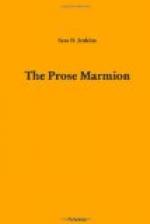Here Marmion and his men rested for two days, attended as became a King’s guest, yet practically a prisoner. This was by the royal command. James did not choose that English eyes should look upon Scotland’s gathering forces until they were ready to march against the foe. When Marmion was moody Lindesay’s wit cheered; policies of war and of peace were discussed, and the lore of Rome and Greece was reviewed.
The second night, as they walked by the fading light on the battlements of Crichtoun Castle, Lindesay carelessly remarked that the journey of Marmion, the toil of travel, might as well have been spared, for no power on earth or from heaven could dissuade James from war. A holy messenger sent by divine command had appeared in spirit, and vainly counselled the King against the impending conflict.
More closely questioned, Sir David told the following tale:
“When the King was but a lad, a thoughtless prince, traitors had set the boy in the army hostile to his royal father. The King, seeing his own banner displayed against him, and his son in the opposing faction, lost courage, fled from the field, and in fleeing fell and was slain. After the battle, James returned to Stirling Castle, seized with deep remorse. Ever after, he inflicted upon himself most severe penance.
“While engaged one day in self-imposed penitential devotions, there appeared to him, in the chapel of Linlithgow, a vision. At the time, around him in their stalls, sat the Knights of the Thistle, chanters sung, and bells tolled. The monarch in sackcloth, and wearing the painful iron belt which constantly reminded him of his father’s death, was kneeling in prayer, when there appeared the loved disciple, John, who in these words warned the King against warfare:
“’Sir King, to
warn thee not to war—
Woe
waits on thine array;
James Stuart,
doubly warn’d, beware,
God
keep thee as he may!’
“When the King raised his head, the monitor had vanished.
“’The Marshal
and myself had cast
To stop him as
he outward pass’d;
But, lighter than
the whirlwind’s blast,
He
vanish’d from our eyes,
Like sunbeam on
the billow cast
That glances but,
and dies.’”
While telling the strange story, Sir David had not marked in the dim twilight the pallor that had overspread the countenance of Marmion, who, after a pause, said:
“Three days ago, I had judged your tale a myth, but since crossing the Tweed, I have seen that which makes me credit the miracle you relate.”
He hesitated, and evidently wished his remark unmade, but pressed by the strong impulse that prompts man to reveal a secret to some listening ear, he told of the midnight ride and the tilt with the elfin knight at Gifford’s Court. The same sly expression crept over the face of the King-at-arms as he asked, “Where lodged the Palmer on that fateful night?”




